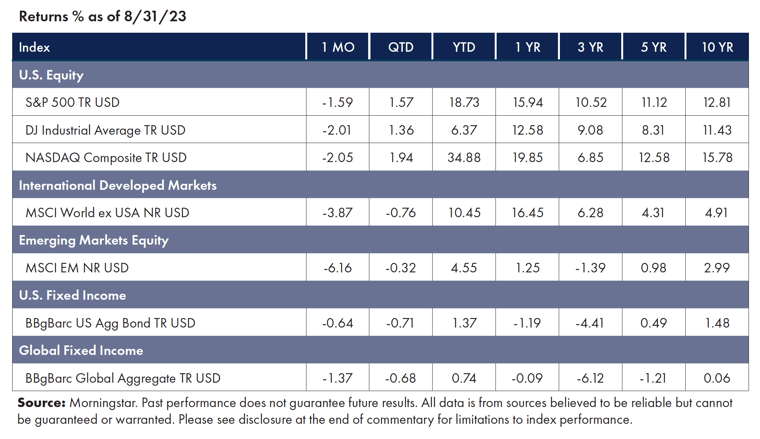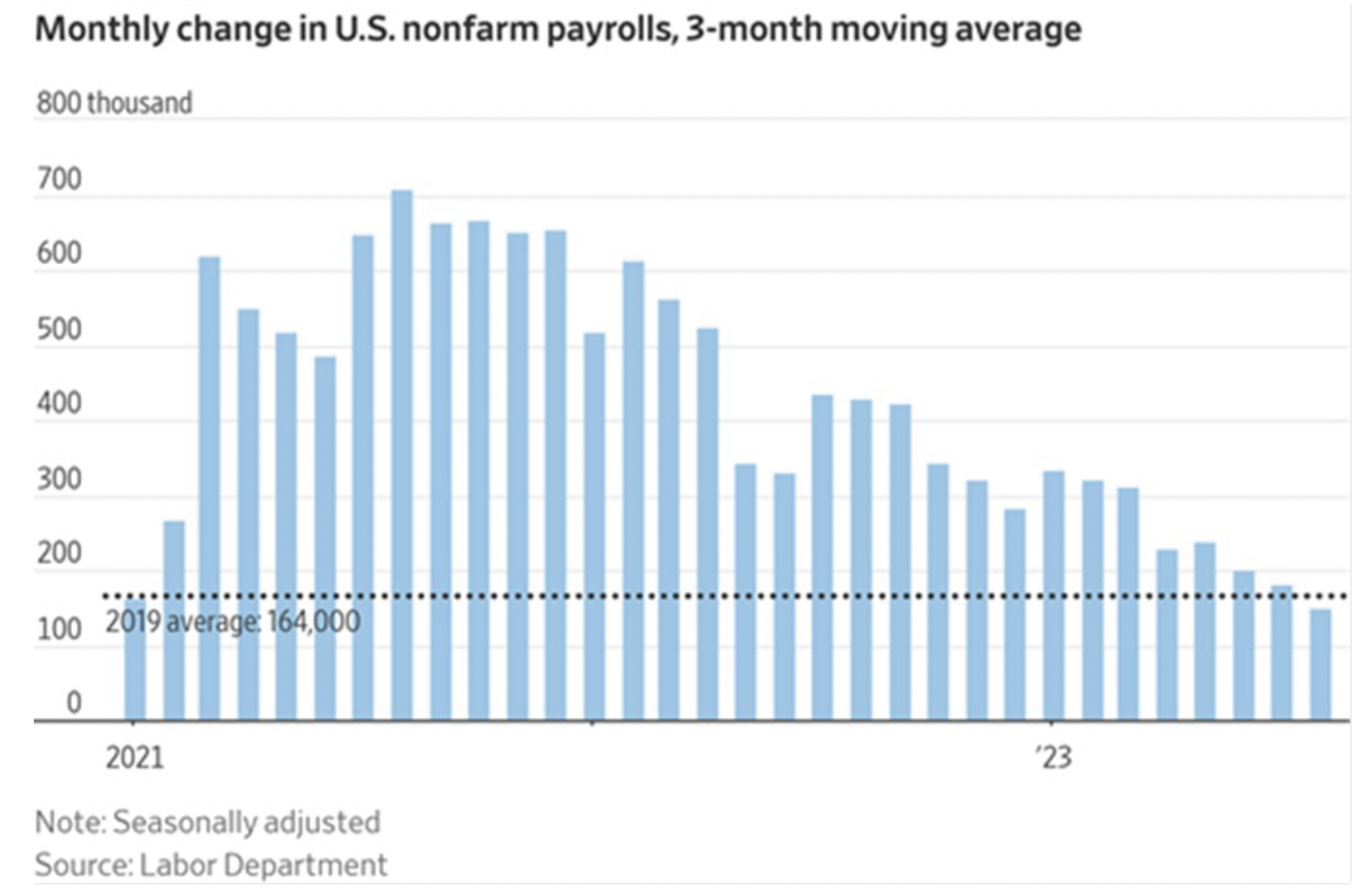-5.png)
Market Commentary: August 2023
Big Picture
Scorching temperatures made this one of the hottest Augusts on record.[1] However, while it was quite warm outside, markets were cooling down. Despite a rally late in the month, all three major indexes had a rough go. After dropping almost -8% at one point, the Nasdaq managed to claw back enough to finish down -2.05%, the S&P 500 finished down -1.6%, and the Dow closed the month down -2.01%. Some of the market malaise was driven by corporate profits falling for the second straight quarter as firms grappled with the impact of higher interest rates. Still, a raft of reasonably positive economic reports at the end of the month pointed to normalizing economic conditions and suggests the Federal Reserve may be on a course to hold rates steady at their meeting later in September.

Equities
Equity markets soured around the globe in August.
- Large caps performed best in US markets, though they were among the worst performers in International and Emerging markets.
- Conversely, small caps struggled domestically but outperformed large caps abroad.
- 10 of the 11 sectors of the S&P were down for the month, except for Energy, which rose 1.27%, thanks to an increase in oil and natural gas prices. [2]
Fixed Income
Fixed-income markets continue to reflect expectations of higher interest rates for a more extended period.
- The US Treasury curve has flattened as the long end of the curve has come up.
- August saw 10-year yields climb for a fourth straight month, reaching as high as 4.36% before finishing the month at 4.09%.
- US bonds beat international credit, with US high-yield posting positive returns. While EM bonds outperformed European peers.[3]
Factors
In the US, factor exposure to Momentum, Quality, and Minimum Volatility outperformed the market. Across International markets, Value and Size continue to be strong contributors, with the addition of Momentum and Quality in Emerging Markets.[4]
NEWS Impacting Markets
"Soft Landing"
The Federal Reserve appears close to achieving the long-anticipated “soft landing” of the economy many have hoped for. Recent economic data at the end of August indicates that the U.S. gross domestic product in the first half of the year was slightly above 2%. Inflation expectations are nearly back to 2%, and home prices have finally started to reflect the Fed’s rate activity, with the Case-Shiller index of the 20 largest housing markets declining -1.2% in June, compared to the prior year.
Concerns of a tight labor market feeding wage pressure through to inflation have also dissipated. Employers added 187,000 jobs in August. While that is a steady pace of hiring, it’s a respite from the torrid rate of job creation during much of the past two years. It’s more in line with the pace of pre-pandemic job growth as seen in the chart below, suggesting that job growth is slowing down to more typical levels.[5]

US Downgrade
In early August, Fitch Ratings downgraded the US sovereign credit grade from AAA to AA+, citing concerns about the country’s growing fiscal deficits and governance issues.
Fitch justified the shift in ratings by highlighting a deterioration in fiscal conditions in the US and a high and increasing government debt burden, all exacerbated by the impact of political conflicts on the US government’s finances. Taken together, these negatively affect the global market for Treasurys.
This is the first significant downgrade in over ten years and aligns with a similar move made by S&P Global Ratings in 2011, during a comparable period of debt ceiling-related political gamesmanship.6
Final Thoughts
September has typically been a lackluster month for markets, and investors appear jittery. Bearish sentiment, as tracked by the American Association of Individual Investors, has jumped to 34.5%. Meanwhile, short sellers have increased bets against domestic stocks to $989 billion from $886 billion at the beginning of the year. [7]
Long-term investors would do well to heed the advice of Warren Buffet: “We don’t have to be smarter than the rest. We have to be more disciplined than the rest.” It is the disciplined investor who, staying patient in the face of a rush to action by other market participants, earns the rewards that accrue to investors over time.
1 https://www.washingtonpost.com/weather/2023/08/15/july-hottest-month-worldwide-heat/
2 Morningstar Direct as of Aug 31, 2023
3 Morningstar Direct as of Aug 31, 2023
4 Morningstar Direct as of Aug 31, 2023
5 https://www.wsj.com/economy/jobs/jobs-report-august-today-unemployment-economy-de847415?
6 Purvis, B., & Kennedy, S. (2023, August 2). US rating cut to AA+ from AAA by Fitch. Bloomberg.com. https://www.bloomberg.com/news/articles/2023-08-01/us-rating-slashed-from-aaa-by-fitch-in-echo-of-s-p-s-2011-move
7 Singh, H. (2023, September 4). Investors head into fall with jitters after summer rally. WSJ. https://www.wsj.com/finance/stocks/investors-head-into-fall-with-jitters-after-summer-rally-5e030f8b?
Symmetry Partners, LLC, is an investment advisory firm registered with the Securities and Exchange Commission (SEC).
The firm only transacts business in states where it is properly registered or excluded or exempt from registration requirements. Registration with the SEC or any state securities authority does not imply a certain level of skill or training. Different types of investments involve varying degrees of risk, and there can be no assurance that the future performance of any specific investment, investment strategy, product or any non-investment-related content made reference to directly or indirectly in this commentary will be profitable, equal any corresponding indicated historical performance level(s), be suitable for your portfolio or individual situation, or prove successful. Due to various factors, including changing market conditions and/or applicable laws, the content may not be reflective of current opinions or positions. Please note the material is provided for educational and background use only. Moreover, you should not assume that any discussion or information contained in this material serves as the receipt of, or as a substitute for, personalized investment advice. Diversification seeks to improve performance by spreading your investment dollars into various asset classes to add balance to your portfolio. Using this methodology, however, does not guarantee a profit or protection from loss in a declining market. Past performance does not guarantee future results.
Index Disclosure and Definitions All indexes have certain limitations. Investors cannot invest directly in an index. Indexes have no fees. Historical performance results for investment indexes generally do not reflect the deduction of transaction and/or custodial charges or the deduction of an investment management fee, the incurrence of which would have the effect of decreasing historical performance. Actual performance for client accounts may differ materially from the index portfolios.
S&P 500 Index represents the 500 leading U.S. companies, approximately 80% of the total U.S. market capitalization. Dow Jones Industrial Average (DJIA) Is a price-weighted average of 30 significant stocks traded on the New York Stock Exchange (NYSE) and the NASDAQ. The Nasdaq Composite Index (NASDAQ) measures all Nasdaq domestic and international based common-type stocks listed on The Nasdaq Stock Market and includes over 2,500 companies. MSCI World Ex USA GR USD Index captures large and mid-cap representation across 22 of 23 developed markets countries, excluding the U.S. The index covers approximately 85% of the free float-adjusted market capitalization in each country. MSCI Emerging Markets Index is a free float-adjusted market capitalization index that is designed to measure equity market performance in the global emerging markets (as defined by MSCI). The index consists of the 25 emerging market country indexes. Bloomberg U.S. Aggregate Bond Index measures the performance of the U.S. investment grade bond market. The index invests in a wide spectrum of public, investment-grade, taxable, fixed-income securities in the United States—including government, corporate, and international dollar-denominated bonds, as well as mortgage-backed and asset-backed securities, all with maturities of more than 1 year. Bloomberg Global Aggregate (USD Hedged) Index is a flagship measure of global investment grade debt from twenty-four local currency markets. This multi-currency benchmark includes treasury, government-related, corporate and securitized fixed-rate bonds from both developed and emerging market issuers. Index is USD hedged. Stock returns represented by Fama/French Total U.S. Market Research Index, provided by Ken French and available at http://mba.tuck.dartmouth.edu/pages/faculty/ken.french/data_library.html. This value-weighed U.S. market index is constructed every month, using all issues listed on the NYSE, AMEX, or Nasdaq with available outstanding shares and valid prices for that month and the month before. Exclusions: American depositary receipts. Sources: CRSP for value-weighted U.S. market return. Rebalancing: Monthly. Dividends: Reinvested in the paying company until the portfolio is rebalanced.
© Morningstar 2023. All rights reserved. The information contained herein: (1) is proprietary to Morningstar and/or its content providers; (2) may not be copied, adapted, or distributed; and (3) is not warranted to be accurate, complete, or timely. Neither Morningstar nor its content providers are responsible for any damages or losses arising from any use of this information, except where such damages or losses cannot be limited or excluded by law in your jurisdiction. Past financial performance is no guarantee of future results.